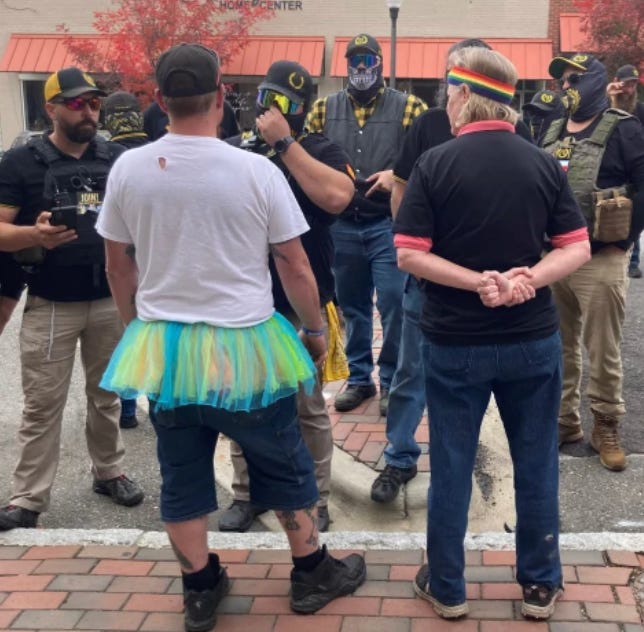A Country Confused and Divided on LGBTQ+
Even though the center of gravity keeps moving toward acceptance of LGBTQ+ people, the issue continues to divide Americans and spark violence
This week, citizens of Moore County, North Carolina are living in darkness with schools and businesses closed due to possible anti-LGBTQ+ motivated violence against an electrical grid sub-station. This is but one of a confluence of noteworthy events regarding LGBTQ+ issues that are confounding the nation. In a healthy political system, one would have expected that over 50 years after LGBTQ+ human rights exploded as a national issue following the 1969 Stonewall incident, we would have settled on a general consensus so these issues were no longer a hot issue of political debate and the motivating cause of episodic violence. But we don’t have a healthy political system and remarkably, even as a sizable majority of the country has become more accepting of LGBTQ+ individuals and culture, virulent opposition continues to make LGBTQ+ issues deeply divisive.
Law enforcement officials have not identified the perpetrators of the electrical grid attack, but there are suspicions that the attackers may be connected to a protest against a drag show that took place in Southern Pines. The power went off soon after the show began, but the show continued with support from the phone-flashlights of audience members. A local activist who claimed to “know why” the power went out and posted a photo of the darkened theatre with the caption “God will not be mocked,” has been questioned by police but appears to have been cleared with respect to the sub-station attack. North Carolina leads the nation in drag show protests, with a Proud Boys contingent having recently disrupted and harassed patrons of a drag brunch fundraiser for an LGBTQ resource center (see the photo above). Like with many other issues such as voter disenfranchisement and criminal justice, my adopted home state sometimes feels like the epicenter of polarization and cultural conflict in America.
All of this occurred against the backdrop of the horrific mass shooting in a Colorado Springs gay nightclub that killed five and injured 18 prior to Thanksgiving and a mere five days after the U.S. Senate passed landmark legislation requiring states to recognize gay and inter-racial marriages performed outside their states. The day after the sub-station attack, the U.S. Supreme Court heard argument in a case brought by a website developer claiming she has a First Amendment right to refuse to provide wedding announcements to gay couples despite a Colorado anti-discrimination law. This week also witnessed 439 congregations voting to leave the United Methodist Church over its tolerance of gay marriage. The whipsaw effect is palpable.
Tying a thread around these disparate events is impossible; rather it is yet more evidence of America tearing itself apart and our social fabric fraying.
LGBTQ+ issues are a prime example of the struggles facing the GOP that I wrote about last week. Senior members of the party understand that a strong majority of the country respects the rights of LGBTQ+ people to live as they please and enjoy equality under the law. Indeed, the Pew Research Center has reported that the percentage of Americans who believe that “homosexuality should be accepted by society” has risen from 51% in 2002 to 72% in 2019. This recognition of political reality led to bipartisan negotiations over the gay marriage bill and 11 Republicans voting to break a filibuster and for final passage. Yet, three times as many GOP senators resisted this step and you can bet the farm that the soon-to-be-empowered House GOP majority will find numerous ways to express its opposition to gay marriage and other LGBTQ+ issues in ways that will alienate young people, independents, and moderates.
And while I blame divisiveness over LGBTQ+ issues primarily on the intolerant right, it is important to acknowledge that polarization is a two-way street.
The threat of violence from anti-LGBTQ+ hatred that is coursing through sectors of American is quite real and I very much respect those who are standing up for their identity, refusing to be intimidated or marginalized. Yet at times, some do the movement no favors by pushing “`wild claims’ of the social-constructedness of sex-differences” on an American public that simply is not ready for this level of change. As Ross Douthat argued in an insightful article that I highly recommend, insisting that everyone recognize these claims and adopt a particularized syntax – like “pregnant capable persons” instead of “women”– may be undercutting hard won gains on gay rights and endangering transgender accommodations that many Americans support.
What I am recommending is an approach towards LBGTQ+ issues that is substantively progressive, but more conservative in its tone, speed, and treatment of skeptics. I do fear that this lack of conservatism may be fueling the backlash against LBGTQ+ people that is surfacing in so many different ways in modern society. Strong leadership (such as that demonstrated by the 11 Republican senators), toning down the extreme rhetoric, tough law enforcement actions against violent bigots, and more tolerance of differing perspectives on both sides of the divide would take some of the heat out of these issues in the short run and, I hope, produce greater societal harmony over the long-term.





Thanks for this comment. I agree with you that there is intentionality as a way to attract voters that most of the rest of the party's agenda provides very little for. This was the theme of What About Kansas. - an excellent book worth reading, but the title may be outdated after a Democrat has won the governorship for 8 years and the abortion referendum result from this summer.
Thanks for being a great reader of my work!!